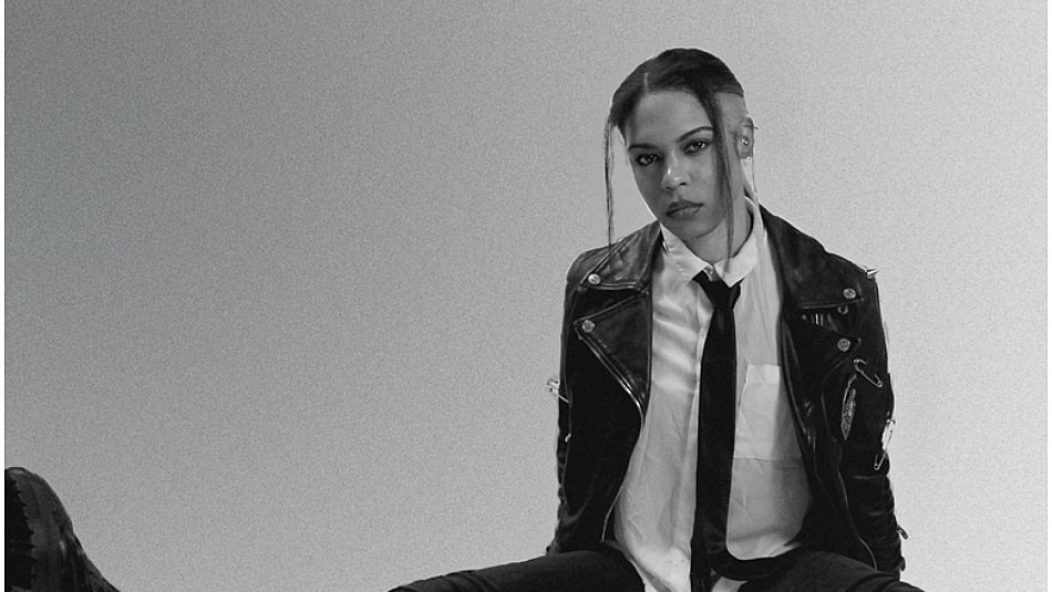
Troi Irons actually hates flowers, and here's the reason why
Harnessing her vulnerability and having an intense desire to wake people up through her music, Troi Irons finds a unique way of gathering attention. From expressing herself through visuals and fashion to expanding on the importance of individuality, Troi Irons creates music bold enough to make new listeners feel as fearless as she is.
Read more: Nova Twins and Meet Me @ The Altar are inspiring the next gen of music
Can you explain your sound and the overall message you try to portray as an artist?
My specific message changes with each project, but my overall goal is to wake people up. I want to get them thinking because it feels like we’re always being welcomed to some sort of passive state. [With] the way that we lived our lives before the pandemic, all of it seems to be rolling people into this passive state of just existing without even living. I think if we fought more and were more awake, we’d have a much more colorful world.
The cover of your 2020 record, flowers, the album, showcases vulnerability—you’re sitting cross-legged on the ground naked. Does this relate to the message you’re trying to convey within your music?
Definitely. This project is called flowers because I have such a strong disdain for flowers. I have this disdain for flowers because, well, for one, the smell. But two, what they represent in society, like vulnerability, femininity and all the expectations that go along with flowers. There’s so much expectation on women and people in general. I have felt those pressures and rejected them so heavily that I think I’ve rejected parts of myself. I shot the cover myself on this analog, vintage camera. And the reason I started shooting myself is because whenever someone else was shooting me, I felt this pressure, and I felt the way they saw me, and I became what they saw rather than the way I see myself. So, I shot this cover, and because it was just me in the room alone with myself, I felt like it was a more vulnerable image than I’d ever seen myself in.
As you gather new fans, what’s something you want them to take away from your music?
I guess I just want people to be themselves. Because if we were all actually ourselves, if we didn’t give so much of a damn about what everyone thought or what the status quote is or what Jane Doe has got that we don’t have, the world would be such a cool place. But it’s not because we’ve got 10 copies of the same person in the same outfit walking down the street at the same damn time. And in a perfect world, everyone would be a different color.
Do you ever have a fear of revealing too much to your audience and letting them know the real you?
I have a fear of not being real enough. Every album for me is the peeling of the onions. It’s another layer deeper. It always surprises me when there’s another layer. So my goal is to be as real as possible because if I can be real and show it, then it’s evolution. If I can release something honest and it [causes] someone else to be honest with themselves, then they can bring their honesty elsewhere. That’s how human culture moves forward.
You released a video in a “quarantine style” for your song “Miss U Now.” How has the pandemic inspired you?
There are two sides. On the one hand, it’s made me a lot more resourceful. I actually completed a music video for “Thorns” that I shot with absolutely no budget. Not because I didn’t want one, but just because I decided it didn’t need one. It’s inspired me to get creative in ways that it [did] when I was 14-15 [years old], walking around with a camera. I think the visual I just shot is probably the best visual I’ve ever shot.
On the other hand, before the pandemic, you’re dealing with people face to face. It was very difficult for me to see more potential [in my art]. People will try to make me feel weird for doing what I’m doing. I found myself doing things like orchestrating a string section for the first time in my life, and because I didn’t have to see them face to face, it was easy. I was able to tell them exactly what I wanted. Whereas before I would say, “I guess this is perfect.” Without having to see that person face to face, I could just stop worrying about their expression.
You write and produce your own music. Is there a specific reason why you work so closely with yourself?
Definitely one of the most important things to me is that I am as much [of] myself as possible. [With] all the artists and creators that I look up to, my truth sensor goes off. Like when I was 16 and heard Bastard by Tyler, The Creator. [You can tell when an artist’s] got producers. There’s a bunch of hands in their work. I heard Billie Joe mixes his lyrics really low until the album is basically finished because he doesn’t want anyone to hear the lyrics that he’s writing. As a kid, this is their truth. That’s why I like this music so much. So I always want to give people the same gift itself. That’s probably one of the greatest gifts that is in your arms to give.
Check out the full interview with Troi Irons in issue 387 featuring cover stars Poppy and Ghostemane available here.







